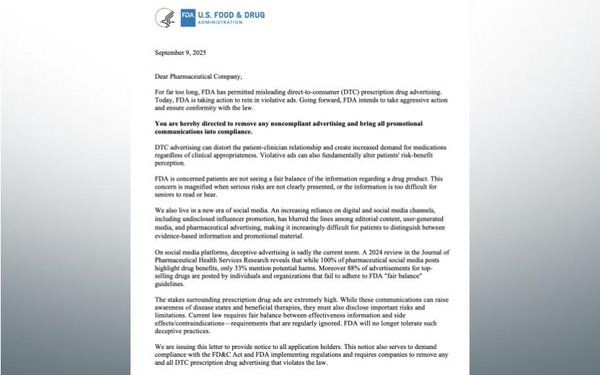
The Food and
Drug Administration this week directed pharmaceutical companies to remove ads that fail to give consumers a "fair balance" of information about drugs.
"Current law requires fair balance between effectiveness information and side effects/contraindications requirements that are regularly ignored," Commissioner Martin Makary said Tuesday in warning letters sent to "thousands" of drug
companies.
"FDA will no longer tolerate such deceptive practices," he writes.
In addition to the warnings, the agency says it issued around 100
letters demanding that companies stop running allegedly deceptive ads.
advertisement
advertisement
"FDA is concerned patients are not seeing a fair balance of the information regarding a drug product," he
writes. "This concern is magnified when serious risks are not clearly presented, or the information is too difficult for seniors to read or hear."
The
letters came the same day President Donald Trump issued
an executive order that could restrict pharmaceutical ads on television. That order -- which, if implemented, will almost certainly face a court challenge -- directs the Health and Human
Services Secretary to require pharmaceutical ads to disclose every possible side effect and interaction.
Makary doesn't give any examples of ads that allegedly
violate the current disclosure requirements, but his letters suggest the FDA views online ads as particularly problematic.
"An increasing
reliance on digital and social media channels, including undisclosed influencer promotion, has blurred the lines among editorial content, user-generated media, and pharmaceutical advertising, making
it increasingly difficult for patients to distinguish between evidence-based information and promotional material," he writes.
"On social media platforms, deceptive advertising
is sadly the current norm," he adds, referencing the 2024 Journal of Pharmaceutical Health Services Research piece "Pharmaceutical
industry promotional activities on social media: a scoping review."
Makary cites that article as a source for an assertion in his letters that 88% of ads for top-selling
drugs are posted by individuals or organizations that don't follow the current guidelines regarding disclosures.
The Journal of Pharmaceutical Health Services Research
piece itself does not appear to support that assertion. Instead, that article -- which discusses several studies -- says a 2012 study that found 88% of ads on YouTube for top-selling drugs were not posted by pharmaceutical
companies, but by individuals or organizations "who did not necessarily" follow the FDA's guidelines.